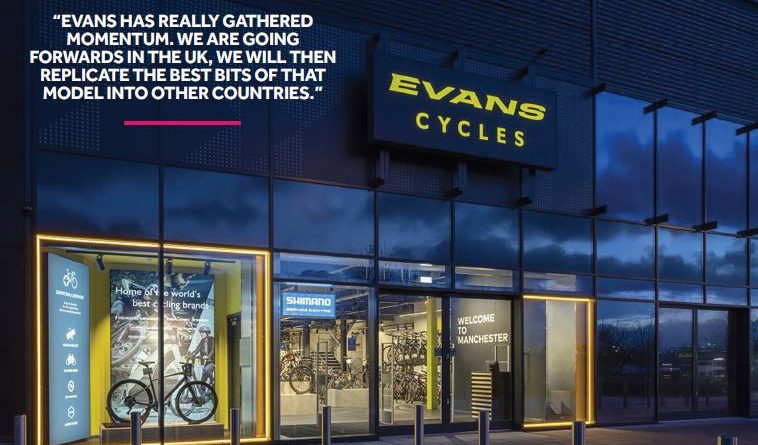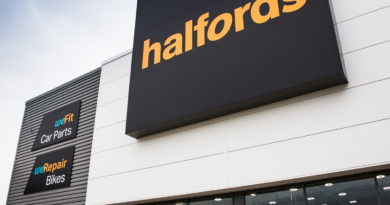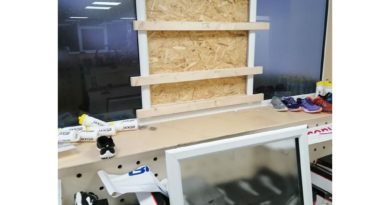INTERVIEW: Evans Cycles unveils masterplan – Evans Go, Universal brand & flagships
Few in the cycle industry will be unfamiliar with Russell Merry, from his days in the 1980s at family business Hot Wheels – which became a multi-million business before being sold to Dorel – to an international leadership position as General Manager of Cycling Sports Group USA. April 2022 saw Merry join Frasers Group – owner of Evans Cycles. One year (and a bit) later, CI.N quizzed the industry veteran for his take on the state of the industry and what Evans Cycles has up its sleeve, including Evans Go stores, new in-house brand Universal and its flagships project…
Clearly the industry is undergoing a challenging period at the moment…
Pre-Covid and post-Covid have been radically different. This period is as acute and dynamic as the peak of Covid. It’s just completely opposite. It’s gone from massive demand outstripping supply to considerable supply outstripping demand. It was a fight to get stock and prices were climbing. And now it’s a decision to choose to buy the right stock. Prices are challenged and margins are challenged.
Do you think things are normalising with a bit more stability this year?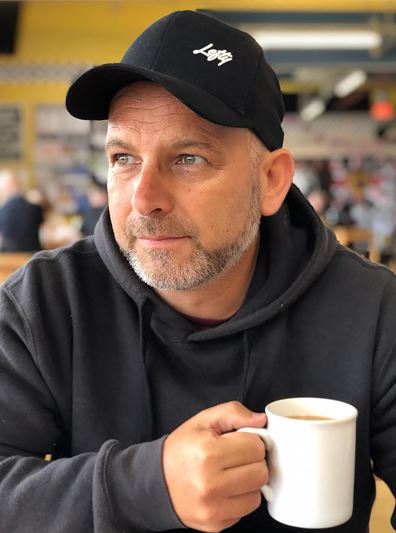
Not yet. The bike market was challenging in 2019 and wasn’t thriving. Then Covid was a boom for some, but it’s been challenging again since. Some businesses went ahead with enormous and extraordinary purchasing, although there were obviously challenges that pushed them, like climbing raw material prices. People felt inclined to make big purchase orders higher up the chain, because of the never-ending rising prices, which pushed orders down the chain. And no one wanted to be left holding the baby. But now we’re seeing a lot more businesses in difficulties. ProBikeKit becoming available was unforeseen.
Frasers Group has gone on to buy ProBikeKit. Can you tell us how that fits into your plans or is the dust still settling on the deal?
The acquisition demonstrates Frasers Group commitment to cycling and belief in the management team – and wider employee group – of the Frasers Group ‘Wheels’ team.
Obviously, this is a massive period of change for the cycling industry, but Evans Cycles itself has been through some huge changes itself. 2018 was a tough year while it was looking for buyers…
Clearly, in 2018, I was a supplier. I saw first-hand the pain that Evans went through. Then came the acquisition carried out by the Frasers Group and I personally got on with the group straightaway. As a supplier, I thought I can deal with these people, they’re honest, they have integrity and they want to see what they can bring to the bike industry.
I think that’s one of the ways we’re trying to achieve things here. And it’s not only Evans Cycles. I’m Managing Director of Wheels at Frasers Group, which is everything with a wheel on, in all the countries where we sell them. And that does have to fit together with the rest of the management team.
Evans Cycles is the core and the UK is at the centre, but the wider Frasers Group is expanding internationally and Wheels will come along with that.
“My view is that the bike industry was not healthy prior to the pandemic, it was sickly.”
It’s been a challenging timeline for Evans if I’m honest. There was the 2018 administration, then things paused before it started to integrate into the group in 2019. Then it had to come up against Covid in a period where it was still finding its feet in a new group. Now we’re dealing with the post-Covid market so that really takes us from 2018 to 2023 without much normality. However, we are very much finding our feet and foundations and they’ve brought me in from the bicycle world. As Managing Director of Wheels I drive strategic action. My view is that the bike industry was not healthy prior to the pandemic, it was sickly.
Things needed to change. The best way to do that is to take the skillset of someone like myself who’s a bike guy and you take the skills of the people who took Sports Direct from one store in Maidenhead in 1982 to a £5.2 billion organisation. Using that retail skill set from all the Frasers Group and using it in the bike industry.
You have to recognise that the bike industry is unique, special and challenging. It’s technical, there are safety issues and concerns, and training is required, etc. So, it’s specialist retailing. I’ve always said that you need to mix the business people with the bike people. If you have too many bike people, you can get sucked into lovely product. If you have too many people that purely look at numbers, they don’t necessarily always take into account the idiosyncrasies of the bike industry. So, we have to look at new ways to do things. If we pick out all the best bits and add it to the strength of the process, then I think we have a unique proposition.
And you have an Evans Cycles flagships project?
We have three pillars of opportunity. One is to utilise the power of the Sports Direct network and get cycling into more of the Sports Direct stores. We are developing a range of own brand bikes that will be sold across the wider Sports Direct network under the Universal brand name, with an opening price point which will welcome people into cycling in an affordable way but still offer a quality product. They will be fully assembled prior to arrival in store or prior to arrival with the consumer. They’ll be brilliantly packaged with an excellent explanation of how you assemble it. Minimal technical skills will be required to assemble them correctly and safely. Then we’ll take more brands, because we’re elevating – a word that is used a lot in the group – elevating the bicycle offering in a wider range of our stores with more brands. Third party brands will be available in Sports Direct.
We will certainly be selling bikes that gets sold at Christmas, but not the kind that end up in the tip by July. We’re having bikes that are sold at Christmas and then handed down to the younger sibling. So, that’s number one in terms of how we’ll utilise the power of Sports Direct.
Number two is that we are creating a very powerful website. The Evans Cycles website will be more comprehensive than, I think, any website has ever been in the bicycle industry, anywhere. We’re working with over 20 suppliers currently at various points of integration of doing dropship with us. And we’re doing that not because we want to abdicate responsibility for holding stock, but just so that we can have enormous breadth of range.
We call it the encyclopedia of cycling, it will be the most comprehensive website in the bicycle industry. These brands support us because we truly are omni-channel. We know how much of our businesses is click and collect. And we know that we have 70 stores. So, we have the brands that we can offer on the web.
Number three is to be the national retailer of choice for premium brands. Evans currently has about 70 stores. We will open some more. We don’t have quite enough in London or the South. I won’t give any specific locations, but it’s really easy to look at a map on our website and see where our locations are. There are a few places to fill in to make sure we are the national retailer, and also the premium brand which then fits in with being an omni-channel retailer, so that we can do click and collect better.
Within Evans, we’re going to break things out a little bit with flagships, one of which will be in Yeovil which has been a TRI UK location. There’ll be a new one in London, which we haven’t found yet. We’re looking for a site that will have to be quite prestigious. Then there’ll be one on our current site at Cheetham Hill, Manchester, which I think is the biggest bike shop in the UK 17,600 ft2. And then Glasgow Fort will be another one of our flagships.
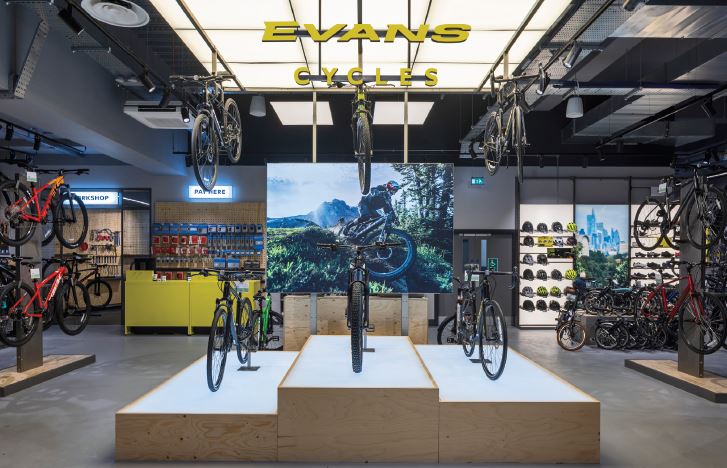 The Evans flagships will carry the absolute latest premium offering from all those brands. So, when a brand like Specialized or Trek or whoever has a global launch of a new exciting bike, maybe with a global embargo on a certain day those five stores will have that absolute premium offering in their flagship location. They will also have what’s called ship from store. So, we will be able to ship orders from there too.
The Evans flagships will carry the absolute latest premium offering from all those brands. So, when a brand like Specialized or Trek or whoever has a global launch of a new exciting bike, maybe with a global embargo on a certain day those five stores will have that absolute premium offering in their flagship location. They will also have what’s called ship from store. So, we will be able to ship orders from there too.
We’ll be able to have those fantastic new and very premium products in store and on the web at the same time. That’s a very interesting efficiency for us that we can have them online and we can ship from the store.
Those flagship stores will have the absolute best of our offering, because it isn’t always possible to put the most expensive bike across 70 stores, that would be too much investment with all the different brands we have. That’s impossible. So, creating the flagships continues to elevate Evans Cycles. And then Evans, of course, has its network to grow.
The third part is we’re going to create stores called Evans Go. Evans Go is a bit like an Express version of Tesco. So what Tesco Express is to Tesco, Evans Go will be to Evans.
Do you have like a target store count in mind for the purely Evans stores?
I think it will go up a little bit in London, and it will fill in on the south coast with some adjustment elsewhere.
Okay, so you’re not aiming for like number targets or anything like that?
I think that much depends on great sites with the right footfall. We’re negotiating on a few sites in London but you’ve got to get the right rent and get everything lined up, so we don’t say we have to have this many stores by this time. Our ambition is to have the right stores in the right place at the right price.
“Pure play online is challenged in all sorts of categories and omni channel is absolutely it. Having the locations, having bricks and mortar is complementary to the web.”
You made the point about the balance of sales through online versus bricks and mortar, and that you need all those physical shops to facilitate click and collect…
We have a motto that it only works if it all works. The group talks about an ecosystem where they have multiple brands that will complement each other. For example, we have gyms and we have sports stores, and we have a premium luxury retail. Pure play online is challenged in all sorts of categories and omni channel is absolutely it. Having the locations, having bricks and mortar is complementary to the web. So, we need to fill in our bricks and mortar locations so we have more click and collect locations. The evidence is that the stores will significantly, ironically, strengthen us online. It’s a very unique proposition that we have, because I haven’t really seen it done before.
I’ve obviously been in the UK bike industry a while and travelled a lot around Europe especially and I’m not sure that I’ve seen it quite like our model. And then we obviously get the regional variation. Now we’ve got stores 17,600 ft2 stores in Manchester, and then we’ve got stores in central London. So, the product mix that you have is very different. That’s where we have to be sophisticated and the group is helping us a lot to get the mix right.
I’m hearing more conversations about retailers specialising, such as a split between eBike-focused shops and more traditional bike shops. And you sort of touched on that, with different ranges in different areas. Is that something you’d look at? Would Evans ever open eBike-only shops?
We’re not. We can see the benefit of eBikes but we are looking at welcoming people into cycling and when they progress we’re determined to take them on their whole cycling journey. That plays into the Universal brand. We’ll cater for everyone.
That obvious example of not selling many mountain bikes in central London or as many Bromptons in a rural northern town holds true. Getting your stock mix right is really complicated but we’re doing a better job of it. You’ve got different sized stores, all in different geographies.
“eBikes expand the market… but do I think that’s going to kill off gravel bikes and kids bikes and everything else? Absolutely not”
Sticking with eBikes, do you see them grabbing a larger share of the market, mirroring northern European nations where they’ve taken share from traditional bikes. Do you have a view on that?
I think we’re very much in line with the big data and our share of sales is in line with the overall market. Where do I see it going? I think the technology will keep improving and changing, maybe the price point of eBikes will come down. Price points of bicycles obviously climbed during the pandemic. Some of that was to do with the fact that container pricing went to $20,000. It’s back down now but I don’t know what’s going to happen with the pricing of bikes in the medium term.
eBikes expand the market, because there are an awful lot of middle-aged people particularly who are spending good money on eBikes who weren’t before. Do I think that that’s going to kill off gravel bikes and kids bikes and everything else? Absolutely not. There are still plenty of people who want to feel the burn of cycling.
We recently heard that Decathlon is looking to launch hire bikes. Is that something that Evans is looking at?
That’s not for us. I think we have still got quite a lot more people to figure out how to sell bikes to.
And also, things like subscription models, I’m guessing that probably won’t be right up your street. But I guess the idea of having 1,000s of customers paying Evans like a monthly fee must be sort of a nice concept.
Basically, the answer is no. We’re not exploring that yet. I think we might wait and see on it.
And the second-hand bike marketplace? Halfords is now dedicating floor space to second hand bikes and there seems to be more emphasis on reusing bikes than having them end up in landfill…
Making better bikes that don’t end up in landfill is exactly what Universal is doing. But I do think there are effective platforms for reselling second-hand bikes at the moment. Also, at this time, there’s a considerable amount of excess inventory in the market at clearance prices. So, how much how less do you then have to offer this person for their second-hand bike and then spend some time and money mechanically checking it and maintaining it and then selling it? I don’t feel that at the moment with excess inventory and current average prices that second-hand bikes work works at retail.
Something else you touched on is international expansion…
It’s a flag to a future, which is that Frasers Group is expanding internationally, particularly in Europe. There are six Sports Direct stores in Austria and these are likely to have an Evans space, so there is international expansion afoot, but alongside the group. That’s obviously one of the advantages of being part of that bigger group. Evans has really gathered momentum. We are going forwards in the UK, we will then replicate the best bits of that model into other countries.
How about the trade shows? It seems they are making a lot of noise right now, in the post-Covid world?
I think people want to meet up again. I think trade shows are valid. People do actually like meeting each other. You do get to know someone in a social setting. I go to shows and will get stuff done by talking to people face-to-face and perhaps having a joke with them.
This year the market is very much about clearance. One of my anecdotes is bicycles are like ice creams. I’ve been saying that for 20 years. When the weather picks up, cycling picks up – we’re going into the season. We’re quite positive about our sales numbers and where we’re going.
Another thing I say to the brands at the moment is that bikes are just two triangles stuck together with some Shimano on. They are all really nice and the front end and the back end are two triangles that are glued together. And they all have third party componentry that levels them.
So, if global brand A reduces the price of its 105-equipped bikes, other global brands’ 105-equipped bikes are also affected by that price reduction. You don’t get that when Mercedes reduce the price of a car. Audi don’t necessarily feel quite so impacted because we don’t know who made the Audi gearbox. We don’t know who makes the Audi suspension. Whereas in a bicycle, you do. It’s all third party visibly branded with big stickers on it. So, at the moment there is considerable excess inventory in the market, which is why all the brands and all retailers are making special offers at the moment.
For the next year, probably the only way to make money in the bicycle industry is to buy things at a discount that you can sell at a discount, because there are, across the market, discounts. That will right itself. It’ll be more important to be absolutely on-point with the latest product launch.
That is exactly why we are putting our flagship stores in place so that as the market rights itself, we will be in the best position to have the latest product launch in stores on the day of release. The flagship programme is primarily for the post-overstock era.
“Those short-term challenges are very serious, but the medium-term prospects for the industry remain good.”
Aside from obviously overstocks, what do you think are the biggest challenges that are facing the industry and the market?
The biggest challenge is it is unique. The industry has obviously a lot of positive factors behind it; it’s positive for the environment, it’s positive for congestion. We’ve had some setbacks in UK government funding recently, but it generally is supported by central government and local government. It’s got many medium-term positives. It has some acute short-term challenges to do with over supply, which have unfortunate consequences. We’ve talked about some people suffering in the market and we’ve seen shops closing as well. Those short-term challenges are very serious, but the medium-term prospects for the industry remain good.
In terms of sourcing bikes from the Far East, are there any sort of particular things, any shifts going on there? Because obviously, there’s a situation in Taiwan and China which you could argue was a risk at some point to the cycle industry. Do you think people are moving any production into different territories?
I’m very fortunate that we have our own offices in Asia. Specifically, we have brilliant bicycle industry expertise. I think Taiwan remains the heartbeat of the industry in Asia. I don’t know if anyone has been particularly proactive about moving production to different parts of the world because they’re frightened of geopolitical events with China. I think that’s probably above our level. Really, I think we have bike people who should sell bikes and I think if we tried to worry about all those other things, we would make decisions that were not directly about selling bikes. I think we’ll cross bridges when we come to them. And obviously, for all the right reasons, hope that nothing ever goes wrong.
Unforeseen things happen, whoever saw Covid coming? But you have got to try and deal with what you know. All we know is, Taiwan is still the heartbeat of the bicycle industry.
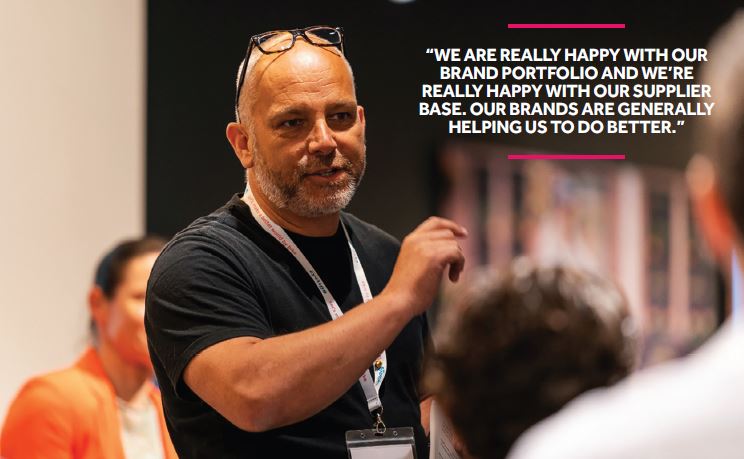
Any thoughts summing up?
I’ve been here over one year. I spent a long time in the supply side, now I’m on the retail side, and learning a lot from the Frasers Group and trying to bring my bicycle industry experience. I think that’s a powerful combination. It’s been great, I’m learning and I think that retail is a fine art.
We call the industry a pre-consolidation industry. It has a very strong independent sector and it is still quite fragmented. And we do see consolidation coming. We see that as an opportunity, because we will take the retail strengths of Frasers Group added to our bicycle industry strengths and come up with the right formula.
Has it given you a greater appreciation of retailers?
Just because you can design a bike frame doesn’t mean to say you can run a bike shop. Because I’m a bike guy, I’ve been able to supply to dealers, or I’ve actually been involved in development of product. But that doesn’t mean to say I was going to be a brilliant retailer. So, I do every bit as much listening as I do talking when I work here. I think I’ve always had an appreciation for the retailer. When I was the General Manager at CSG North America, I shut the three Cannondale stores, because we were not doing a great job of them.
I’ve always appreciated the skills of the retailers. Clearly some are better than others. There’s some brilliant IBDs and there are some that will not last industry consolidation. There’s a lot of different skills in retail. So, yes. In answer to your question, I do have a greater appreciation for retailers.
Running 70 of them is tricky. Some stores are 2,000 ft2 in the city centre, then you’ve got a 17,000 ft2 store in Manchester. That’s a lot to get your head around. There are some people who go into it just because they like bikes. And that is very much where we talk about getting this blend of getting the bike people in with the retail expertise. I think we’ve got a good formula. We are really happy with our brand portfolio and we’re really happy with our supplier base. Our brands are generally helping us to do better.
